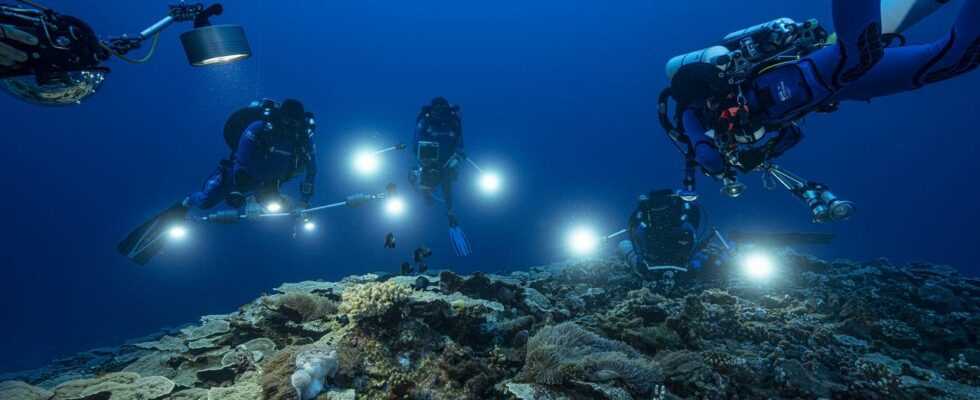BIODIVERSITY – A team of UNESCO scientists announced on Thursday that they had discovered one of the largest healthy coral reefs ever recorded off Tahiti. It now represents a source of hope, as coral reefs suffer from climate change.
The editorial staff of LCI –
It is a glimmer of hope from the bottom of the oceans. A team of Unesco scientists has discovered one of the largest healthy reefs ever recorded below 30 meters, off Tahiti. This one, which has giant corals in the shape of a rose, would be preserved from all pollution and the effects of climate change.
“The immaculate condition of the rose-shaped corals and the extent of the area they cover make this a very unusual find”, underlines Unesco in a press release. The reef extends over three kilometers long and between 30 and 65 meters wide, between 35 and 70 meters deep, specifies the organization. Some giant corals are two meters in diameter.
No signs of “stress and illness”
For Unesco, this is an extraordinary discovery because, until now, the vast majority of known coral reefs in the world are found at depths of up to 25 meters. This discovery therefore seems to indicate that there are many other large reefs, located at depths of more than 30 meters, in the so-called “twilight zone” of the ocean, which we simply do not know exist. . “It’s a little explored area. What we know well are the areas between zero and 30 meters”, explains to AFP Laetitia Hedouin, marine biologist and specialist in corals, from the French research center CNRS and the environmental research organization CRIOBE.
“These corals do not show signs of stress or disease”, she continues, while corals located closer to the surface in French Polynesia experienced a bleaching episode in 2019. Starfish can also ravage corals by devouring them. “We have lost about half of our coral reefs in the past 70 years”, says to the Skynews channel Julian Barbiere, of Unesco. “But coral reefs are very important for the health of the oceans – we know that they are home to around 25% of all the species we find in the marine environment. Reefs are also where we can potentially find new species and new drugs”, he continues.
A discovery that should lead to others
The diving expedition took place in November 2021, thanks to specific diving equipment to go down that far. “The team made dives totaling around 200 hours to study the reef and were able to witness the spawning of the coral”, says Unesco. “It was magical to be able to observe these magnificent giant corals in the shape of roses that stretch as far as the eye can see. It was like a work of art”, says in the press release Alexis Rosenfeld, French photographer and founder of the 1 Ocean campaign, who led the diving mission.
Temperature sensors have been placed in the area. “We are at the start of a monitoring program that we hope will be long term”, to better understand why this coral reef has visibly not suffered from climate change and what its population dynamics are. This finding also raises the question of “the taking into account of these deep zones in the development of marine protected areas”, emphasizes Laetitia Hedouin.
Read also
“The state of knowledge of the oceans is still limited, with only 20% of the planet’s seabed (…) mapped”, says Unesco. More dives are planned in the coming months to study the reef and the marine life it supports. Unesco will also work with local communities to give them the tools they need to protect it – such as designating marine protected areas.
On the same subject
The most read articles
Who was Jean-Jacques Savin, who died trying to row across the Atlantic?
Covid-19: how to transform your health pass into a vaccination pass?
LIVE – Covid-19: Marlène Schiappa positive, she places herself in isolation
Is “more than 50% of the meat consumed in France” halal?
In hospital, a quarter of patients positive for Covid-19 were admitted for another reason

